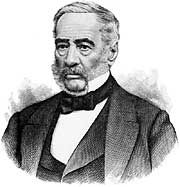Long-dead Authors Make Amiable Companions:
Translating Philippe-Joseph Aubert de Gaspé
By Jane Brierley
"What's it like living with an author who has been dead for over a century?" Montreal Gazette books editor Bryan Demchinsky asked me one day. He was referring to Philippe-Joseph Aubert de Gaspé, whose 500-page mid-19th-century memoir I had translated (A Man of Sentiment, 1988), as well as a collection of de Gaspé's short stories, Yellow-Wolf & Other Tales of the Saint Lawrence (1990).
One literary critic has said that you'd better like your subject, because you're going to be living with him or her for as long as some people are married (these days, anyway). After nearly 20 years of living with de Gaspé, I have to admit that he has been a delightful companion.
It was my husband who introduced us. Returning from a trip to Quebec City in the 1970s, he handed me an early edition of de Gaspé's Mémoires (1866). Ignoramus that I was, I had never heard of de Gaspé or his once-popular historical novel, Les Anciens Canadiens (1863). Almost without my realizing it, de Gaspé's Tristram-Shandyesque opening lured me to the manoir fireside. I found myself sitting in the shadows just beyond the firelight as the spinner of tales wove his gentle magic.
Here was a veteran raconteur who had spent many years in retirement at his seigneury on the shore of the lower Saint Lawrence River, helping his wife educate their 13 children. He often occupied the long winter evenings reading aloud or exchanging stories with the older ladies of the family—mother, mother-in-law, and aunt—who themselves had many a tale to tell, handed down from the days of New France.
And yet this spinning of tales wasn't just a pastime. The joy and pain of remembrance come through clearly in all de Gaspé's work, and one soon learns to look for the tale-behind-the-tale. The rollicking youngster who swam off the Quebec City quays with Lower Town toughs and taunted the British tars ("les goddams," as the boys called them) also experienced deep sorrow. In his melancholy moments he often turned to an old habitant whose untutored wisdom gave him solace.
 |
|
| Philippe-Joseph Aubert de Gaspé |
|
To express the gamut of an author's emotions in another language is to share in them profoundly. It was the desire to know more about de Gaspé that led me to translate his autobiographical work, and later his novel and short tales. The feeling that the author was hovering somewhere over my left shoulder was constant throughout those years. It was a benign hovering, although I sensed that he was as eager as I for the book to appear in English, and that this admirer of Shakespeare, Sterne, Scott, and Dickens would have high expectations.
Authors and their era become a part of one's psychological baggage, as I discovered. One of my favourite restaurants in Quebec City is the cozy Anciens Canadiens on St. Louis St., a five-minute walk from the Château Frontenac. The building housing the restaurant was de Gaspé's home in his early married years. The interior still bears the stamp of domestic life around the time of the War of 1812, with low, beamed ceilings and small hearths. On my second visit there, my husband and I sat in the back room waiting for a steaming tureen of soup. In a corner, beneath photographs of de Gaspé and his wife Suzanne, sat an elderly man with the air of an habitué. He was frowning as he read his newspaper. There was something familiar about him—something I couldn't put my finger on. I concentrated on my soup to avoid staring. Suddenly it came to me: the man looked uncannily like de Gaspé. I felt a tingling in my spine and turned to look again . . . but the table was empty.
The above text is an updated version, edited by the author, of her article which originally appeared in THE GAZETTE, Montreal, Saturday November 16,1991.